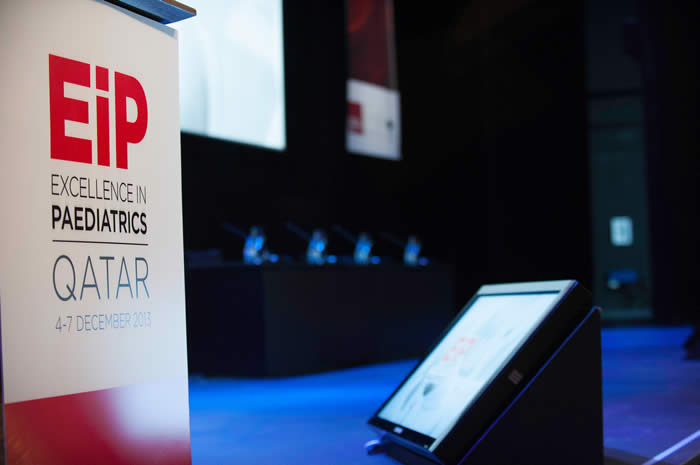WCMC-Q faculty join conference to improve children’s healthcare
December 2013

WCMC-Q faculty helped deliver educational workshops to medical professionals visiting from all over the world at the Excellence in Paediatrics (EiP) Conference. Dr. Amal Khidir, WCMC-Q’s assistant professor of pediatrics, and Dr. Marcellina Mian, associate dean for medical education, teamed up with colleagues from Hamad Medical Corporation (HMC) to present two workshops to faculty, residents and nursing professionals at the conference, held at Qatar National Convention Center from 4-7 December.
The EiP Conference is a global forum where leading pediatric academics and healthcare professionals meet to share their knowledge and skills, and to discuss the latest clinical developments relating to the care of children and adolescents. The 2013 event was the fifth in EiP’s history and marked the first time it has been staged outside of Europe.
Explaining the first of the two workshops, Dr. Khidir said: “The professionalism workshop is a collaborative work presented by Dr. Khalid Alyafei, Dr. Ahmad Al Hammadi, Dr. Magda Wagdy, Dr. Abdul Nasser Elzouki, and me. In this workshop our aim was to demonstrate how to interpret and implement the theoretical principles of professional responsibility in a real-world setting. Values like professional competence, being respectful to juniors, communicating with other health providers and patients, and managing conflicts of interest seem straightforward in theory, but in practice medical professionals are often presented with difficult situations and dilemmas.”
Dr. Khidir added: “The key is to equip the participants with the tools they need to analyze the types of situations they are likely to encounter, and to give them the knowledge and confidence they need to conduct themselves professionally while simultaneously delivering the best quality of healthcare to their patients.”
In the Sharing the Light workshop, Dr. Khidir, Dr. Mian and their colleagues Dr. Magda Wagdy and Dr. Ahmad Al Hammadi explained the challenges posed by teaching groups that comprise learners of different levels of education, ability and interest in common scenarios such as clinical rounds, general clinic and small group discussions.
Dr. Khidir said: “Teaching a group with a diverse range of ability levels presents a number of challenges. For example, as teaching faculty run a clinical session they face the knowledgeable, indifferent, distracted, and dominant learner, while discussing patient care. The workshop demonstrates how to deal with problems like this as they arise so that all of the learners stay on track and benefit from the session.”
The workshop taught participants how to foster a stable and stimulating learning environment, techniques for dealing with disruptive or dominant learners, and supporting residents as teachers. A tool that can be used is the SNAPPS, which consists of a number of steps that learners can follow to help them quickly and effectively analyze a patient’s case, recommend a management plan and select issues for further self-directed learning.
Both workshops used interactive discussions and short films, which were produced collaboratively by WCMC-Q and HMC faculty, as tools to get the information across and as triggers for enriched discussions on each topic.
Dr. Mian also gave a lecture at the event, entitled Intersectional Approach to Child Maltreatment Prevention.
Dr. Mian said: “Child maltreatment is a complex problem that can have lifelong negative health and behavioral consequences in those individuals who experience it. Addressing the problem requires a coordinated intersectoral response. This session aimed at providing participants with information to help them identify the role of the health, social and legal sectors, including the judicial system and law enforcement. These professionals are key stakeholders in the process, which includes provisions to make growing up safe for all children, systems for identifying children and families at risk for maltreatment and services to address the needs of children who have suffered some form of maltreatment.
“The EiP Conference provided a stimulating forum for professionals from diverse backgrounds to dialogue on issues critical to the well-being of children, such as healthy living, vaccinations, rare diseases, baby skin care and meningitis. Common problems in child health and child development were discussed with an emphasis on evidence-based approaches to their identification and management. The rich exchange of knowledge and ideas took place both during formal sessions and in informal meetings and gave visiting participants some insight into the Arab context.”
